Ricochet is the best place on the internet to discuss the issues of the day, either through commenting on posts or writing your own for our active and dynamic community in a fully moderated environment. In addition, the Ricochet Audio Network offers over 50 original podcasts with new episodes released every day.
 Let’s All Go to the Polling and Get Ourselves Some Facts
Let’s All Go to the Polling and Get Ourselves Some Facts
 There’s been a lot of talk here about the candidates’ characters, legal challenges, personal outlooks towards out-groups, and so on. But, for a moment, let’s step back from emotion and look at something more concrete: polls. National and state polling are still getting their acts together — only Rasmussen is polling on a week-to-week basis for the general election — but we can get a sense of the trend lines to try to understand where the race currently is and how it might proceed from here.
There’s been a lot of talk here about the candidates’ characters, legal challenges, personal outlooks towards out-groups, and so on. But, for a moment, let’s step back from emotion and look at something more concrete: polls. National and state polling are still getting their acts together — only Rasmussen is polling on a week-to-week basis for the general election — but we can get a sense of the trend lines to try to understand where the race currently is and how it might proceed from here.
(A few notes about the polls I’ll be citing, all of which are from Real Clear Politics. In 2008, RCP’s polling average was quite accurate, predicting a 7.6 percent popular vote victory for Barack Obama, who won by 7.3 percent. Despite our head-in-the-sand act four years later, RCP’s polling average correctly called the election, though not as accurately:Tthey projected that the president would win by a mere 0.7 percent; in actuality, he had a 3.9 percent advantage over Mitt Romney.)
Currently, Hillary Clinton holds an averaged 4.7 percent advantage over Donald Trump. If immediate history is any guide, this means that she would win by anywhere from 4.7 to 8 percent if the election was held today. This should be distressing for all center-right voters, although the #NeverTrump among us would be slightly less-dismayed than those at least willing to vote for Trump over Clinton.
General Election
Rasmussen (see below) gives us the most data to work with so we can see a general trend in the polls. Though it shows both candidates rising since the spring, Clinton trends upward more sharply than Trump, which means she probably has a higher ceiling. It should be noted that this includes the only national poll that has shown Trump winning at any point (see data for June 29).
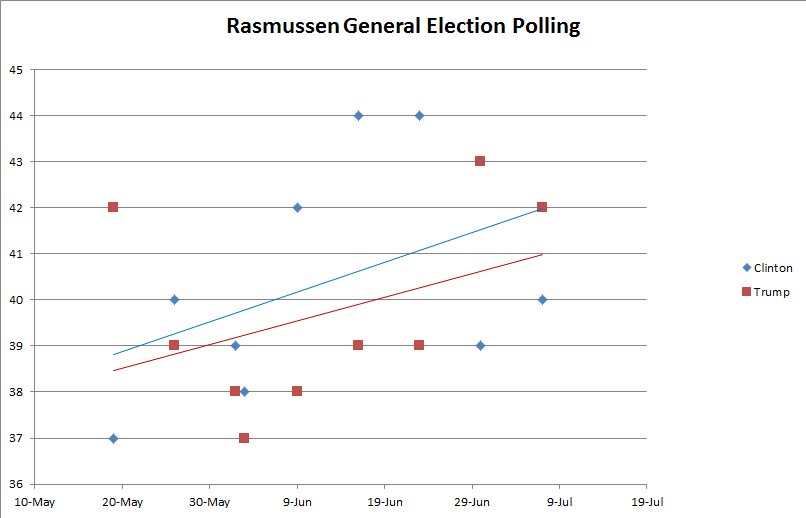
Reuters/Ipsos (below) has conducted only four polls during the same period as Rasmussen’s seven, but is more representative of the overall trend amongst all other polls. They find — I suspect they are correct — that Clinton is slowly climbing while Trump slowly declines:
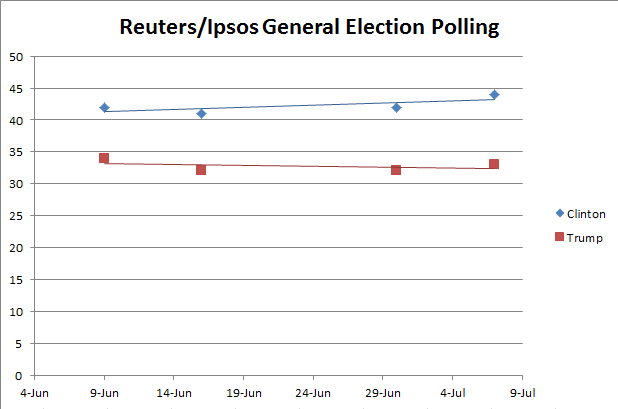
As I said before, only Rasmussen has ever found Trump ahead of Clinton in head-to-head contests. Moreover, no national poll from any source that includes Gary Johnson or Jill Stein has shown Trump victorious since he clinched the GOP nomination. This includes: Gravis, CBS/New York Times, Fox News, NBC/Wall Street Journal, ABC/Washington Post, Quinnipiac, IBD/TIPP, The Guardian/SurveyUSA, Bloomberg, CBS News, CNBC, Monmouth, CNN/ORC, The Economist/YouGOV, PPP, and USA Today/Suffolk.
State Polls
National polling is of use, but a better picture requires us to look at state-level polling. The traditionally important battleground states tell a similarly bleak story for Trump’s chances. In Florida (below), Trump has almost tied Clinton in the last poll. However the last poll, by Gravis, is of registered voters, not likely voters. Clinton has not lost a poll of likely voters in Florida since March:
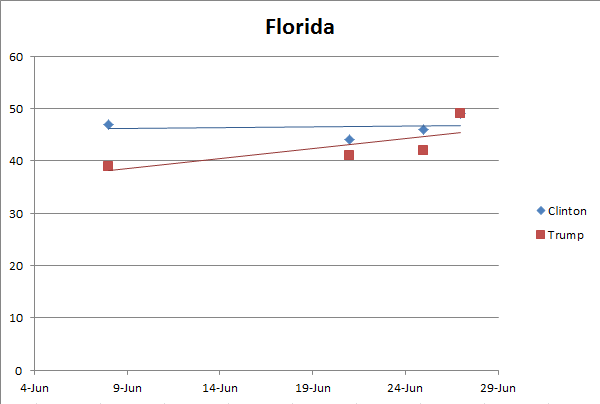
In Ohio, there has only been one poll of likely voters, which Clinton won. Gravis gave Trump his almost-tie at the end of June, but Clinton is up about three points otherwise. At the moment, I’d rate both Ohio and Florida as “lean blue.”
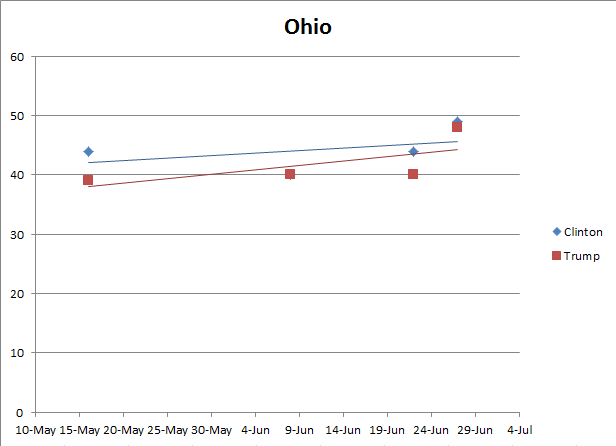 Favorability
Favorability
Our last examination is of the candidates’ favorability ratings. The upshot is that both are underwater, though Clinton’s numbers are, generally, less-bad than Trump’s. Her average unfavorability rating is 15.7 percent higher than her favorability; the former has been relatively flat while the latter has slightly risen. Given the traditional consolidation behind Democratic nominees, we can expect her favorability numbers to continue to rise.
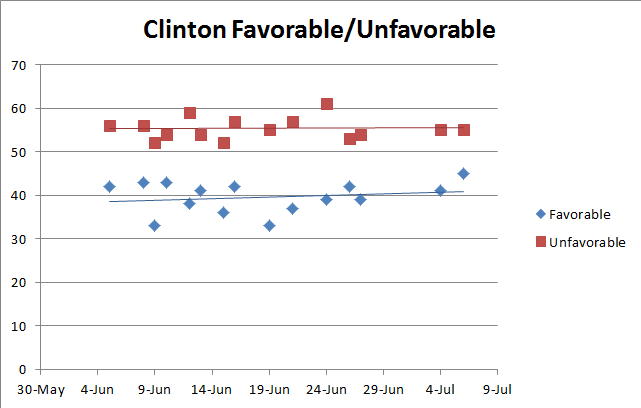
Trump’s numbers are much more volatile. A serious question arises in his numbers: Have we ever seen a nominee whose unfavorability approaches 70 percent? His only hope is that, given a relatively stable sample size, his favorability rating is rising and his unfavorability rating is falling. But given Trump’s flamboyance, lack of a rapid response shop, small campaign size, and the general antagonism between him and traditionally pro-Republican commentators, that may not last.
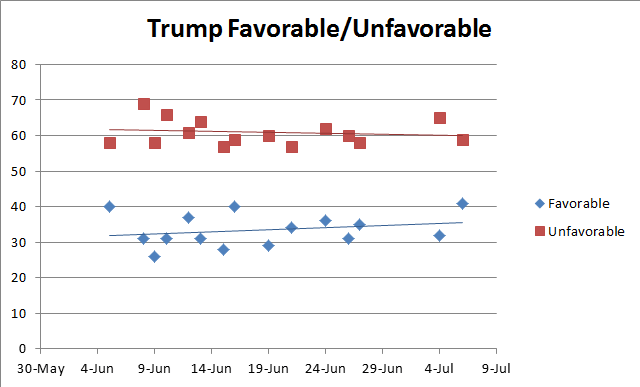
Until more (and better) data becomes available, I am hesitant to draw too many conclusions from all this. However, unless Trump drastically increases his campaign organization’s size and discipline, it seems unlikely he will triumph in November. Based on the data currently available, the RNC should seriously consider unbinding delegates in case the situation deteriorates any further.
Published in General



As an example, Nate Silver (and fivethirtyeight) usually go to decent lengths to warn their readers about the limitations of their methodology and what a figure like “80% probability of a Clinton win” means (namely: it’s far from a shoo-in for Clinton). But most people who pass on 538’s figures in any form tend to neglect those caveats, thereby overselling the certainty in their predictions.
Yet when those predictions turn out to be wrong, everyone dumps on Silver et al.
I do agree that polling has been accurate enough given the inherent difficulties. But it is much less accurate than the other type of prediction the media carries out (forecasting the weather), and it’s much less accurate than it’s often made out to be by the outlets who commissioned those polls.
Furthermore, it’s not accurate in the way our current media cycles function. Electoral polling is somewhat the opposite of weather forecasting: the weather report is generally only accurate for a few days out, while long-term forecasting is just a roll of the dice.
On the other hand, electoral polling tends to be fairly accurate when taking an aggregate of polls over a long time frame; however, short-term trends in polling tend to reflect background noise and irrelevant mood swings more than any actual change in the final result.
However, because our consumption of media has turned into a freakish ADD-like cycle instant gratification, in which the news of 15 minutes ago is already forgotten, our own behavior exacerbates the imprecision of polling.
Very true. In addition to not looking into the methodology I would say the sheer profusion of competing polls contributes to the public perception of unreliability. Instead of looking at an average of polling like RCP or HuffPo, people have a tendency to believe the poll they want to be true, even when it’s a serious outlier. Republicans seem particularly enamored with Rasmussen despite its recent track record being one of the worst among major pollsters.
Absolutely agree. I’ve actually been tracking polling in aggregate for a few weeks after stopping post Super Tuesday 2 and felt there was enough to start publishing posts again about the state of the race.
There are lots of pollsters who’ve put out one, two or three polls in the last three months so the picture is still forming. Hopefully polling will accelerate in the coming months prior to the conventions.
I’d like to defend the Brexit polls a little; they predicted a close outcome, and it was a close outcome. Some of them got the side that narrowly won right, some didn’t, but in terms of polling quality, it’s more important to get the numbers right than to get the outcome of those numbers right. If the current polls are similarly accurate, and Trump outperforms by similar margins, Clinton wins.
So I spend some time on Ricochet chiding those who claim that a Trump loss is inevitable (or, in its most absurd form, that a Trump loss is inevitable but a Johnson win is possible), but I should note that they’re less wrong than those who claim that the 20% side of that equation is inevitable, and that it’ll be a landslide.
I’m not saying that it won’t be a landslide for Trump, mind, just that the numbers seem pretty far from the sort of thing on which one could reasonably base a claim of certainty.
My local theater still uses that jingle before films.
Conjecture: a Cauchy distribution is a better fit than Gauss for the accuracy of polls.
The effort to “unbind” delegates and dump Trump is futile. If it happens, I am certain that many Trump supporters will stay home and Republicans will lose again. Like it or not, he won the Republican primary. Even when the race was down to Trump versus Cruz and many (like me) thought Trump would never get more than 30 to 40%, Trump got over 50% in many States.
Trump is very close in the swing states and that is where this election will be decided as Austin has already pointed out. If he can get a high turnout of Republicans in those States and do reasonably well with Independents he can certainly beat Hillary. I don’t care if Hillary destroys him in places like California where Republicans have no chance.
Rather than continue ignoring the will of Republican primary voters, I suggest the Never Trump crowd either get behind him or stay home. Losing means we lose the Supreme Court and the likes of Justices Kagan and Sotomayor will re-write our Constitution. I cannot understand how anyone hates Trump so much that they would let that happen. Even if Trump is a lousy President, he can only do damage for 4 years. Losing the Supreme Court will haunt us for much longer and do far more damage than Trump could ever do.